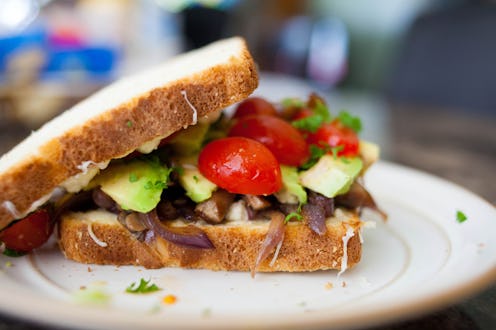
Junk food is addictive, and designed to make us crave it, eat it, and buy more of it. Food corporations have mastered the art of making their goods hard to resist. Before a new food product ever even hits grocery store shelves, it goes through extensive taste tests and focus groups to pinpoint the ideal recipe to maximize profits. So, it isn’t always easy to find ways to eat healthier food, in spite of the many benefits.
Food writer Megan Kimble got fed up with the American food industry’s standard M.O. — aka processing as much as possible — and she decided to take a seemingly drastic step. For a year, Kimble made it her mission to learn about our food system and how to cut out processed foods, while actually doing it. Basically, she put her money where her mouth is, big-time.
In her resulting book, Unprocessed: My City-Dwelling Year of Reclaiming Real Food , Kimble gives readers a rundown on her fascinating findings. The statistics and facts are at times disheartening, but Kimble proves that not only is healthy eating possible, you don’t have to grow all of your own food to do it. Whether you have your own farm or you live in a high-rise, there are steps you can take to literally clean up your eating habits.
Check out these eight ways you can eat healthier, even if you’re a city dweller like Kimble:
Stick to Your Shopping List
Supermarket design is as well researched and tested as food taste. Everything from aisle length to shelf placement is intentional, so just stepping through those automatic doors puts you in an environment meant to encourage you to spend. And what is meant to catch your eye? “Off-list items” in the form of processed food. If you have to hit up a supermarket, make a shopping list beforehand and resolve to stick to it.
Find Your Local Food Co-op or CSA
The less time you spend in supermarkets, the better, so good alternatives are shopping at a food co-op or joining a CSA (Community Supported Agriculture) to buy seasonal food straight from local farmers. You can see if your area has a CSA here: localharvest.org/csa
Cut Back on Meat
Kimble calls reducing your meat consumption the “easiest and cheapest” way to unprocess, it because meat is unfortunately “one of the most intensely processed foods available in our supermarkets.” It’s not impossible to find it unprocessed — farmers’ markets and food co-ops will have it — but it will cost you more.
Choose Restaurants Wisely
When picking a restaurant, check out the menu online beforehand to make sure there are unprocessed options. If you have questions about items once you're there, your waiter or waitress should be able to help. As a vegetarian, I ask my share of questions and always worry that I’m being annoying, but I’ve found that as long as you’re polite, no one ever seems to have a problem with it.
Take a Cooking Class
Clean eating requires doing more of your own food preparation, so it may be worth investing in some actual cooking lessons. Whether you need to brush up on the basics or you’re interested in a specific type of cooking, there’s always more to be learned.
Opt for Fresh or Dry Produce Instead of Canned
The closer to the source you can buy food, the better. In the case of produce, this means getting it fresh or dried is preferable than buying it canned or pre-packaged. If you’re worried about items going bad, you can cook them and then refrigerate or freeze the leftovers to extend their life. If you’re really ambitious, try doing your own canning.
Select Organic Dairy Products
Kimble buys organic dairy “without exception,” because studies show that it’s more nutritious, has fewer harmful chemicals and pesticide residues, and is free of antibiotics and hormones. Organic milk is even good for heart health. The organic food industry may not be perfect, but it has certain advantages when it comes to dairy.
Splurge a Little to Buy Alcohol From Small, Local Producers
If you can afford to, try to purchase alcohol that is made locally by smaller breweries or wine makers. It's more expensive, but it's worth it. The cheaper stuff comes from larger manufacturers who are making it on an industrial scale. Why is that bad? Well, a wine maker Kimble interviewed explained that commodity wine is made in such large batches that “everything goes in there. Leaves, rodents, green grapes, rotten grapes.” It pains me to say it, but that definitely ruined cheap wine for me.
Images: SodanieChea/flickr; Giphy (8)